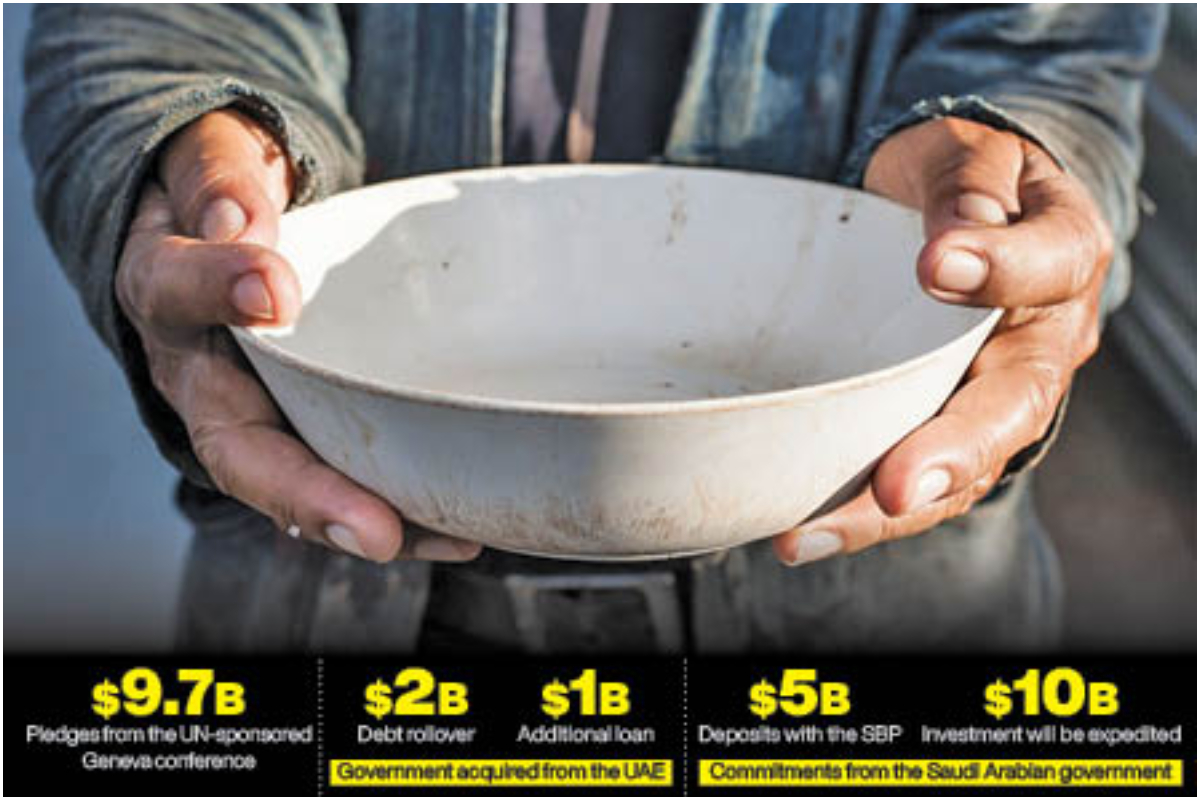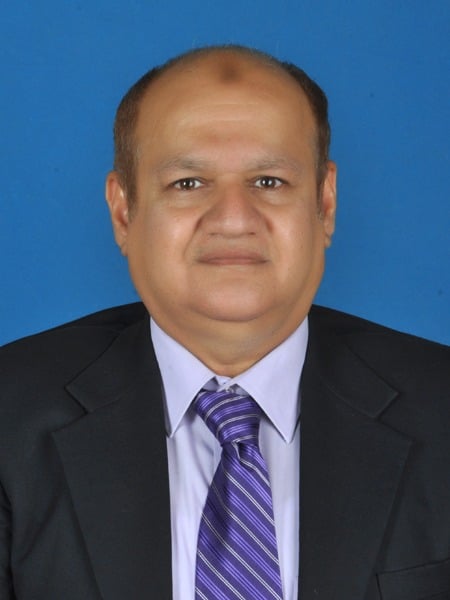
Filling the Begging Bowl
IMF unmoved by Geneva pledges, wants hike in gas, electricity prices
Islamabad: Pakistan is still confronted with a daunting task to convince the International Monetary Fund (IMF) for the revival of its Extended Fund Facility programme, despite getting pledges of $9.7 billion from the United Nations (UN)-sponsored Geneva conference.
During the conference, Saudi Arabia and the UAE have also assured the Pakistan authorities to enhance the ceiling of deposits kept with the central bank.
On the sidelines of the conference, Prime Minister Shehbaz Sharif asked the IMF to give some respite in its demand for the economic reforms, as the country is making all-out efforts to provide relief to the flood-affected people.
The prime minister said he was trying to persuade the IMF to give some breathing space, as it tackles the ‘nightmarish’ situation.
Pakistan’s economy has crumbled alongside a simmering political crisis, with the rupee plummeting and the inflation at the decades-high level, coupled with the flash floods and the global energy crisis, which further burdened the country.
A $6 billion IMF deal negotiated by the previous government was restarted after Pakistan finally met the condition of ending subsidies on fuel. But it has so far received only half of the funds — the last payment in August — with a further ninth review of the package” still pending.
“Even before the floods hit Pakistan, we were already facing humongous challenges. We have to approach the IMF and resurrect an agreement, which was violated by the previous government — and accept even harsher conditions,” Sharif added.
During his visit, the prime minister held virtual meeting with IMF Managing Director Kristalina Georgieva, who could not attend the Geneva moot because of her prior commitments.
Besides, Finance Minister Ishaq Dar also met the IMF delegation but failed to break the deadlock. Sharif after his return told newsmen that the IMF team will soon visit Pakistan to resume the dialogue but so far the IMF has not responded or indicated that it will send its team to Pakistan.
Though Dar claimed that a discussion with the IMF in Geneva focused on revenue shortfall and super tax in litigation, as well as, narrowing down the issues on the power and gas rates. However, he did not mention any discussion with the IMF on the widening gap between the interbank and open market rates.
The finance minister and his team held a detailed meeting with the IMF on the sidelines of the Geneva conference and issues have been narrowed down on power and gas sector reforms, he said.
On the fiscal side, a special tax of 10 per cent, which has been delayed due to a court’s stay order and they were informed that it would be recovered by the Federal Board of Revenue (FBR) in staggered manner and this is the reason that the revenue target has not been changed, he added.
The fund also wanted the withdrawal of untargeted Kissan and exporters packages, he added.
Dr Ashfaque Hasan Khan, former adviser to the Ministry of Finance and a senior economist, said that the recent pledges is a good omen for the country and will calm the nerves of the market but the government will get this amount in two to three years, whereas it desperately needs cash for the repayment of debt and to finance the current account deficit.
“After the 2005 earthquake, we held international donors conference in Islamabad, where multilateral and bilateral donors made pledges of over $7 billion but we got only $2.5 billion in cash,” he remarked.
According to him, even this time the government should pinned high hopes with the pledges made at the conference.
During the Pakistan Tehreek-e-Insaf (PTI) government, everybody was talking about inflation but now the people are fearing the possibility of a default and restrictions on imports made the investors and common man uncertain about the future of this country.
“The government performance is now confined to huge advertisements in print and electronic media and the current situation reminds me a quote of famous Indian writer and journalist Khuswant Singh that when the government performance is zero, it relies on advertisements,” he added.
He also termed the statement of Dar that foreign currency deposits could also be used as reserves, as highly irresponsible.
“Though the finance minister clarified his position but, unfortunately, damage has been done because in 1998 after the nuclear tests, the Pakistan Muslim League (PML-N) government has freeze the foreign currency accounts, which badly shattered the confidence of the people and for a long time no one was willing to transfer the foreign currency to the country.
Dar’s statements regarding determining exchange rate and undermining the IMF programme irked the IMF authorities.
Experts believed that Dar’s political stunts further complicated the fate of the IMF programme. Farhan Mehmood, head of Research at Sherman Securities, said that of the total gas circular debt of Rs1.5 trillion, Rs850 billion will be settled in the balance-sheet via cross-adjustment of receivables and payables against various energy companies, while the remaining of the Rs650 billion will be resolved through hike in gas prices.
The government may buy some time for the settlement of Rs850 billion with the IMF, as multiple entities are involved.
“Besides, the settlement of Rs650 billion gas circular debt provides a blanket of 120 per cent hike in gas prices for all sectors, which seems quite ambitious, as the government may face strong criticism. We believe that the government may increase the gas prices in phases, he commented.
Regarding the electricity tariff, he said because of the availability of cheap hydel electricity, the circular debt was static but from January 2023 onwards, the electricity through hydel generation will not be possible, while the use of expensive fuels such as furnace oil and the liquefied natural gas (LNG) will increase the cost of electricity and resultantly the circular debt, as well.
The IMF has reportedly sought up to Rs7.5/unit increase in the electricity tariff across-the-board, to recover over Rs700 billion from the consumers, as the previous commitments made by the government were not met.
An increase of Rs7.91/unit was agreed with the IMF and the World Bank for the last fiscal year but it was only partially implemented till July 1, 2022.
Sources said the IMF has been assured that the recovery will be 93.83 per cent, but in fact, it remained less than 90 per cent (FY22 at 90.43 per cent). Transmission and Distribution losses were greater than 17 per cent (FY-22 at 22.16 per cent) against the commitment of 15.83 per cent, made with the IMF and World Bank.
Electricity demand remained depressed at 44 billion units during first quarter of current fiscal year (FY-22 at 44.4 per cent) whereas IMF had been given the understanding of 45 billion units.
According to sources, the government has extended subsidy of Rs281 billion to K-Electric, despite the fact that it was not budgeted.
The IMF has also been given assurance that the exchange rate for the last fiscal year would be Rs194 against the dollar, which remained at over Rs200/dollar. Likewise, KIBOR would be 10.5 per cent, while it remained at 15 per cent.
After the Army Chief General Asim Munir’s successful visits to the UAE and Saudi Arabia, the prime minister not only able to rollover the maturing $2 billion debt but also acquired additional $1 billion from the UAE government, as work on a proposal to offer 10 to 12 per cent stakes in the listed government companies is still at its infancy stage.
A coordination committee setup to make preparations for the premier’s visit, reviewed the list of entities that could be offered to the UAE for investment, including RLNG plants, Pakistan telecommunication Company Limited (PTCL) and the shares of other profitable state-owned entities.
In April 2022, Sharif visited the UAE to seek additional funding. However, it offered to buy stakes in the listed government entities equal to $2 billion. Since then, the government has been unable to finalise the modalities of the entities it can offer.
Saudi Arabia also said it could increase its investment in the cash-strapped Pakistan to $10 billion, as well as increase the ceiling on its deposits parked with the State Bank to $5 billion.
Crown Prince Mohammed bin Salman has directed a study to increase Saudi Arabian investment to $10 billion, from the previous $1 billion announced in August.
Comments
Even before the floods hit Pakistan, we were already facing humongous challenges. We have to approach the IMF and resurrect an agreement, which was violated by the previous government — and accept even harsher conditions

Shehbaz Sharif
Prime minister
After the 2005 earthquake, we held international donors conference in Islamabad, where multilateral and bilateral donors made pledges of over $7 billion but we got only $2.5 billion in cash

Dr Ashfaque Hasan Khan
Senior economist
Catch all the Economic Pulse News, Breaking News Event and Latest News Updates on The BOL News
Download The BOL News App to get the Daily News Update & Live News.








 Read the complete story text.
Read the complete story text. Listen to audio of the story.
Listen to audio of the story.